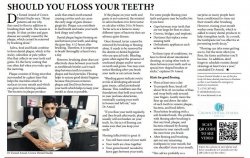Fareed Amod - Should you floss your teeth?2020-11-12 Dr Fareed Amod of Crown Dental Studio says, "Many patients ask me why they need to floss in addition to brushing their teeth. The reason is simple. It's that cavities and gum disease are usually caused by the plaque, which cannot be removed by brushing alone."
Saliva, food and fluids combine to form dental plaque, which is the sticky, colourless or pale-yellow film that collects on your teeth and gums. It's the fuzzy coating that you often feel when you wake up in the morning. Plaque consists of living microbes surrounded by a gluey layer that helps the microbes attach to surfaces in your mouth and which can grow into thriving colonies. The bacteria in plaque produce acids that attack tooth enamel causing cavities and can cause the early stage of gum disease - gingivitis. Plaque can contribute to bad breath and make your teeth look dingy and yellow. Dental plaque begins forming on and between your teeth, and along the gum line, 4-12 hours after brushing. Therefore, it is important to brush thoroughly at least twice a day. However, brushing alone does not effectively clean between your teeth as toothbrush bristles can't reach deep between teeth to remove plaque and food particles. Flossing helps to ensure good dental hygiene because this process removes plaque and food from between your teeth which helps to keep your mouth as clean as possible. If the plaque on your teeth and gums is not removed, the mineral in saliva hardens it to form tartar or calculus within 24 to 36 hours. Tartar acts as a home to many different types of bacteria that can advance gum disease. Once formed, tartar cannot be removed by brushing or flossing alone. It needs to be removed by the dentist or dental hygienist who use special tools. Bleeding gums often signal the presence of uncleaned plaque and/or tartar on teeth and gums. You may even notice bleeding after you brush your teeth or eat certain foods. "Bleeding gums indicate you're at risk of developing advanced gum issues, called periodontal disease. This condition sees the foundations that hold your teeth in your jawbone deteriorate, eventually causing your teeth to loosen and fall out," says Dr Amod. "If you floss your teeth regularly, and then brush afterwards, plaque usually will not harden on your teeth. So, the act of flossing can make sure that you keep your smile." Flossing (effectively) is great if: • You still have most of your teeth • Your teeth are close together • Your gums haven't receded to leave gaps between your teeth. For some people flossing your teeth and gums may be ineffective if you have: • Gaps between your teeth that are too large for floss to clean • Crowns, bridges, and implants • Dentures that replace some missing teeth • Orthodontic appliances such as braces "In these types of conditions, we have to think about interdental cleaning, or using other tools to clean between your teeth such as special tree-shaped brushes or sticks," explains Dr Amod. Hints for good flossing • Floss at least once a day • To properly floss, break off about 30 to 45 cm inches of floss and wrap both ends around your fingers. Gently move the floss up and down the sides of each tooth to remove plaque, bacteria, and food debris. • Floss before brushing with a soft-bristled brush. The problem with flossing after brushing is that any food, plaque, and bacteria released by flossing remains in your mouth until the next time you brush. • After flossing and brushing, spit out any remaining toothpaste in your mouth, but you shouldn't rinse your mouth. "This advice probably as a surprise as many people have been conditioned to rinse out their mouth after brushing. However, rinsing your mouth washes away fluoride, which is added to many dental products to help strengthen teeth. As a result, the toothpaste isn't as effective at preventing tooth decay." "Flossing can take some getting use to, but the more often you floss, the faster and better you'll become. In addition, don't forget to schedule routine dental cleanings at least twice a year," concluded Dr Amod. Crown Dental Studio is one of the few truly 24-hour dental practises in Durban as this is not limited to emergency dentistry treatment. T: +27 81 207 8621 E: info@dramod.co.za W: www.dramod.co.za |
Fareed Amod - Should you floss your teeth?
Copyright © 2025 KwaZulu-Natal Top Business
